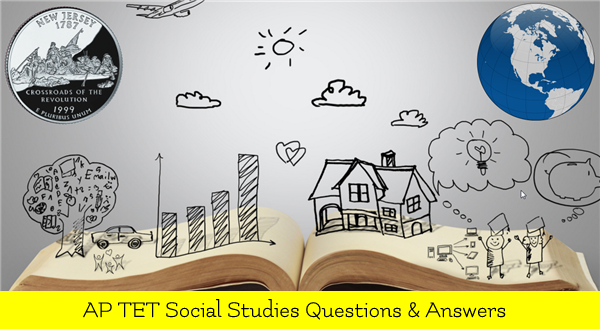
AP TET Social Studies Quiz in English (Multiple Choice Questions in English):
Question 1 : Which of the following is not the aspects of child development?
A. Physical development
B. Social development
C. Cognitive development
D. Maturity
Correct Answer: D
Question 2 : Development can be described as growth in
A. cognitive state
B. physical state
C. social state
D. All of the above
Correct Answer: D
Question 3 : Which of the following is not correct about meaning of development?
A. It is a series of changes as a result of maturity
B. It is a series of changes as a result of experience
C. It is a mere progressive series of changes
D. None of the above
Correct Answer: C
Question 4 : Development sequence starts with …… and ends with ……
A. ovum-sperm, zygote
B. ovum – sperm, blastocyst
C. blastocyst, zygote
D. ovum – sperm, fertilisation
Correct Answer: B
Question 5 : The feeling of shame and pride develops in …….. stage.
A. infancy
B. childhood
C. adolescence
D. adulthood
Correct Answer: B
Question 6 : The major difference about the concept of development between JE Anderson and E Hurlock is that Anderson considers it as ……… and Hurlock considers it as …
A. growth and behavioural changes, processes for maturing an organism
B. growth and behavioural changes, growth and changes relating to maturity
C. growth and changes relating to maturity processes for maturing an organism
D. None of the above
Correct Answer: B
Question 7 : Which of the given statement is partially correct about the characteristics of development?
A. Each phase of development has its own variable
B. Development is a process that is continuous predictable and has individual differences
C. Each phase of development is with its own characteristic behaviour
D. Development is affected by cultural changes to a certain extent
Correct Answer: D
Question 8 : Consider the statement about development in human beings
I. Upto adolescence.
II. Upto adulthood.
III. Throughout life.
Which of the statement(s) given above is correct?
A. Only I
B. Only II
C. Only III
D. None of these
Correct Answer: C
Question 9 : Consider the given statement(s)
I. Mental development states that sensation is a gateway of knowledge.
II. Motor development accounts for the strength and speed.
III. Change in the individual behaviour due to maturation is learning.
Which of the statement(s) given above is/are correct?
A. Only I
B. Only Il
C. Only III
D. All of these
Correct Answer: C
Question 10 : Choose the incorrect matching with the help of given codes
I. Physical nervous system and development endocrine glands
II. Adolescence love for exploration.
III. Early childhood : sensitive language development period.
A. Codes
l is incorrect matching
B. Both I, II are incorrect matching
C. Both II, III are incorrect matching
D. None of the above
Correct Answer: D
Question 11 : Early childhood period is
A. sensitive to language development
B. crucial for maturity level
C. meant for learning through the forced behaviour
D. is complex in terms of growth and development cognitively
Correct Answer: A
Question 12 : The age group 6 to 11 years falls under
A. early childhood
B. pre-natal age
C. later childhood
D. None of these
Correct Answer: C
Question 13 : Consider the following statement(s)
I. Physical health and mental abilities are influencer of emotional development.
II. Fulfilling social expectations comes under social development.
Which of the statement(s) given above is/are correct?
A. Only I
B. Only II
C. Neither I nor II
D. Both I and II
Correct Answer: D
Question 14 : In which of the following stages do children become active members of their peer group?
A. Adolescence
B. Adulthood
C. Early childhood
D. Childhood
Correct Answer: A
Question 15 : Which of the following statements is not correct about development?
A. Each phase of the development has hazards
B. Development is not aided by stimulation
C. Development is affected by cultural changes
D. Each phase of the development has characteristic behavior
Correct Answer: B
Question 16 : Which of the following statements is not true about development?
A. Development is the product of interaction
B. Development follows an orderly sequence
C. Development is individualised process
D. Development proceeds from specific to general
Correct Answer: A
Question 17 : Which one of the following statements best sums up the relationship between development and learning?
A. Development is independent of learning
B. Learning trails behind development
C. Learning and development are synonymous terms
D. Learning and development are inter-related in a complex manner
Correct Answer: D
Question 18 : Which of the following development tasks is not appropriate to the late childhood?
A. Learning physical skills necessary for ordinary games
B. Achieving a masculine or feminine social role
C. Achieving personal independence
D. Learning to get along with age-mates
Correct Answer: B
Question 19 : The meaning of development is
A. progressive series of changes
B. progressive series of changes as a result of motivation
C. progressive series of changes as a result of motivation and experience
D. series of changes as a result of maturation and experience
Correct Answer: C
Question 20 : The best method to study growth and development of the child is
A. psychoanalytic method
B. comparative method
C. development method
D. statistical method
Correct Answer: A



